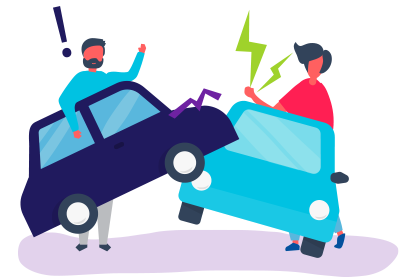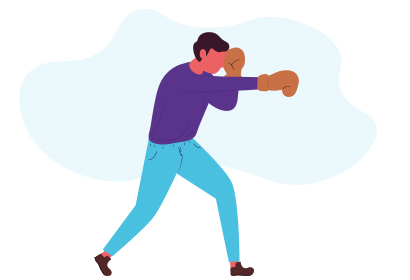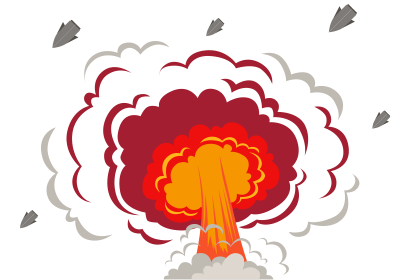Traumatic Brain Injuries, or TBIs, are a common cause of permanent injury and death in the United States. While severity levels vary from mild to critical, it’s estimated that 1.5 million Americans sustain TBIs every year. Of those 1.5 million, over 230,000 results in hospitalization, and 50,000 result in death. Severe TBI often causes comas, for which the mortality rate stands between 76% and 89%.
March is Brain Injury Awareness Month, so we thought we’d give you some “neighborly” advice on what the most common causes of brain injuries are and how to spot the symptoms.
It’s estimated that 1.5 million Americans sustain TBIs every year.
Most Common Causes of Traumatic Brain Injuries

FALLING
The most common cause of TBIs are falls, and many of these accidents happen right in your home. Research from the World Health Organization revealed that more than 164,000 people fall off ladders in the United States every year, and more than one million people fall down the stairs.
The most hazardous home activity? Bathing. More than 230,000 visit emergency rooms around the country due to falling in the bath or shower. More than 14% of those that fell were hospitalized, as reported by the CDC. While falling is most common in older adults and younger children, those of us in the middle are not immune. Care should be taken when engaging in any activity that could result in a fall.

VEHICLE COLLISIONS
Accidents involving cars, pedestrians, motorcycles, or bikes are another common cause of TBIs. The CDC reported that car accidents are the leading cause of TBIs resulting in hospitalization.
It’s estimated that over 16,000 car accidents happen in the U.S. every day. While they can’t prevent every head injury in the event of an accident, wearing your seatbelt in the car and a helmet while on a motorcycle can go a long way toward protecting your brain.

VIOLENCE
Domestic, gunshot wounds, child abuse, and other assaults are also responsible for TBIs. Shaken Baby Syndrome (SBS) is one example of this kind of violence. Between 1,000 and 3,000 children will be SBS victims every year, and 80% of survivors suffer from permanent brain damage.

SPORTS INJURIES
Sports injuries are a more commonly known cause of TBIs. High-impact and extreme sports like skateboarding, baseball, football, lacrosse, and many others are responsible for more than 2 million concussions across the United States, and 10% of all contact sport athletes sustain concussions yearly.
Over the years, increased safety measures have been put in place to protect athletes from TBIs, but brain injuries still cause more deaths than any other sports injury.

EXPLOSIVE BLASTS AND COMBAT INJURIES
Most common in military personnel, explosive blasts are another cause of TBIs. The Defence and Veterans Brain Injury Center reported that more than 50% of injuries in the Afghanistan and Iraq conflicts resulted from explosive devices.
Between 2000-2017 more than 375,000 military members were diagnosed with a TBI.
What To Look For
As with most injuries, there are levels of severity to TBIs. Each level can present with different symptoms. Below are TBI levels and symptoms:
Mild TBI
- Physical Symptoms
- Loss of consciousness (for a few seconds or a few minutes)
- Loss of balance or dizziness
- Disorientation or confusion
- Sleeping more than normal
- Nausea or vomiting
- Difficulty sleeping
- Fatigue
- Issues with speech
- Sensory Symptoms
- Blurred vision
- Ringing in the ears
- Changes in ability to smell
- Bad taste in the mouth
- Sensitivity to light or sound
- Cognitive Symptoms
- Memory issues
- Difficulty concentrating
- Mood swings
- Depression
Moderate to Severe TBI
While moderate to severe TBIs will likely include many of the signs and symptoms of a mild case, other symptoms might present within a few hours to days after the initial injury. These symptoms include:
- Physical Symptoms
- Loss of consciousness for several minutes to hours
- Lack of coordination
- Headaches that worsen or won’t go away
- Clear fluids draining from ears or nose
- Inability to wake up from sleep
- Numb or weak fingers
- Persistent nausea or vomiting
- Seizure/convulsions
- Pupil dilation (one or both eyes)
- Cognitive Symptoms
- Coma and other disorders of consciousness
- Slurred speech
- Agitation, combativeness, or other unusual behavior
- Profound confusion
Signs of Traumatic Brain Injury in Children
It’s also important to remember that children might not present signs and symptoms the same way adults do. Infants/toddlers that aren’t able to tell you if they have a headache, trouble seeing, confusion, or other similar symptoms, might exhibit some of the following:
- Nursing habit changes
- Unusually irritable
- Persistent crying and inability to be consoled
- Can’t pay attention
- Change in sleep habits
- Seizures
- Sad or depressed mood
- Drowsiness
- Loss of interest in favorite toys or other favorite activities
Remember to also use preventive measures whenever possible, like wearing helmets and seat belts and refraining from driving under the influence of drugs and alcohol. Installing handrails in bathrooms and non-slip mats in showers and tubs can also go a long way in protecting some of the most vulnerable among us. Adults over 60 are a common group at risk for TBIs but so are children under the age of four. Safety gates at the top of stairways, keeping stairs clear of clutter, window guards, and using shock-absorbing materials on playgrounds are all proven tactics to keep children safe from TBIs.
Brain injuries are scary and have the potential to cause severe and permanent harm. Knowing the signs of a TBI can not only prevent long-term brain damage but also save a life. If you suspect someone you know has a TBI, look for the signs listed above and, if necessary, seek emergency care at your nearest Neighbors Emergency Center.

Back to Blog